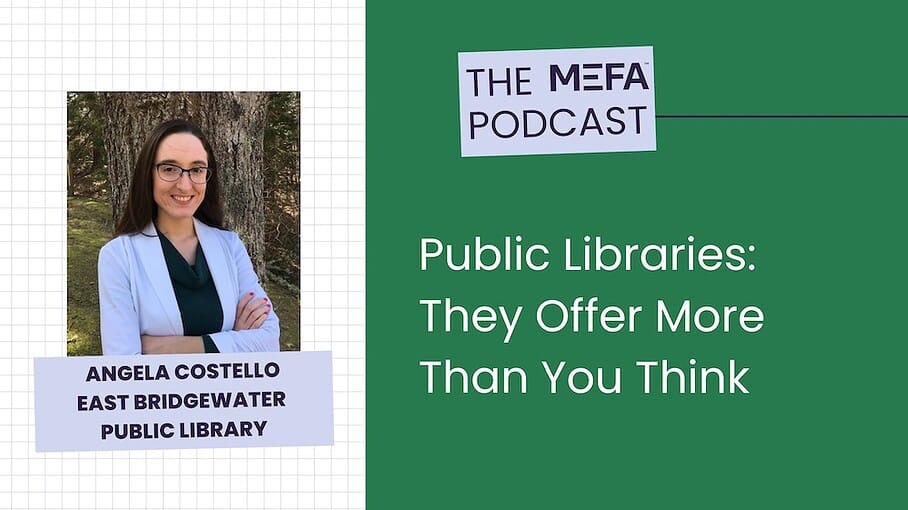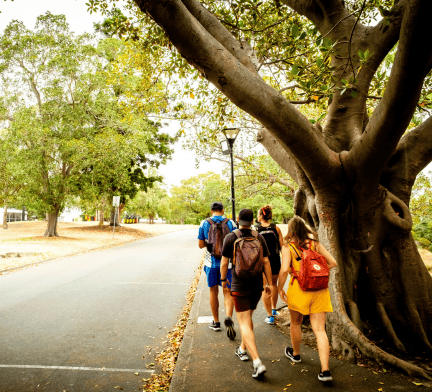Resources Mentioned in this Episode
Angela Costello: [00:00:00] The number one quality that makes a good librarian is just a desire to want to help people of all walks of life because the public library is one of the only places in our society that everyone is welcome regardless of age, background, demographic and you’re not expected to pay money when you walk through the doors.
And so because of that, at the library, we serve everyone from babies and toddlers to teenagers, to the seniors who come over on the Council on Aging bus. But we also do serve members who are suffering from homelessness or mental illness, and so just having that willingness, that compassion and patience to help every kind of person who walks through the doors, I think is like the number one quality of being a good librarian.
Jonathan Hughes: Hi everyone, and welcome to the MEFA [00:01:00] Podcast. My name is Jonathan Hughes, and you just heard from our guest on the show today, librarian and author Angela Costello. So we often describe MEFA as a free resource with a public service mission to help families. We are available to all. And Angela, our guest on the show today is here to highlight another such institution with deep roots in Massachusetts, the library.
And it’s an institution that we partner with. So Massachusetts is, of course, home to the first public library in the United States and Library network. Throughout the Commonwealth have worked with MEFA to hold events and to offer resources to help us in our mission to help families to plan, save, and pay for college and career readiness.
So we wanted to highlight that relationship, but we also wanted to highlight everything else that the library can offer students and the community at large. So we talked about that. We talk about a career or degree in the [00:02:00] library sciences, and we talk about a lot more. I really love this conversation.
I had a great time meeting Angela, our guest. I know you will too. I’ll be back at the end of the show to wrap things up. Now, let’s not waste any more time and meet our guest on the show today.
Angela Costello: Thank you so much for having me here today. My name is Angela Costello and I am the young adult librarian at the East Bridgewater Public Library, which is the small town public library of East Bridgewater, Massachusetts, population of almost 15,000 people.
As a young adult librarian, it’s my job to primarily serve teens in grades seven through 12. And so for that, I plan programs and curate the young adult book collection and also do various other things around the library as well. I’ve been in this role for almost four years now, but I’ve been working in libraries since 2014, so over 10 years in libraries.
And when I’m not working at the library, I’m also a self-published [00:03:00] author. I’ve written three young adult novels and I also do a little freelance editing in my spare time as well.
Jonathan Hughes: But did Angela always want to work in a library?
Angela Costello: That’s a great question. So obviously with my past and writing and editing.
I’ve always loved books and reading. I spent a lot of time in libraries when I was a kid. So after I graduated from Brandeis I was fortunate enough to get a part-time job at the local library in my hometown. And then I was just testing the waters. I didn’t really know what it would look like to be a librarian.
But the more time I spent working there, the more I just realized how much I loved helping people. And then as I grew into working with young adults, I became very passionate about helping teenagers. I think that being a teen is such a difficult time in life and having someone who can be supportive help you to find the resources that you need and really give you a safe space that you can go to outside of home and school.
It’s something I became very passionate about [00:04:00] and that’s how I became a young adult librarian.
Jonathan Hughes: And what’s that like? What are your interactions like with the students?
Angela Costello: Obviously our interactions start at the end of the school day. The kids usually get out around two o’clock, and we have quite a few kids that come here straight from school.
Our high school is just right down the street so they can walk over. And they do, we usually have about 15 or so kids every day after school On Fridays, that number can be anywhere from 30 to 50 teenagers. And then on early release days, we can have 60 or 70 kids in this room. And so my job is first of all to maintain the room, make sure that everyone’s behaving, getting along, but also having a good time.
Our room has a lot of fun things for the kids to do. We have a video game area so the kids can play on the Nintendo Switch and the PlayStation. And I also just try to be here to provide volunteer opportunities for the kids. That’s a big need in this town because any teen who wants to be part of National Honor [00:05:00] Society needs a certain amount of volunteer hours. So we do get a lot of kids who come here looking for that.
Jonathan Hughes: That was interesting to me. So I asked Angela if she could tell me more about how volunteering in the National Honor Society worked.
Angela Costello: It’s with the high school. They usually in their junior year can apply to be part of National Honor Society and for that they need to have a certain number of community service hours.
And so we get a lot of kids who come here because they need, x number of hours by the end of the school year. And we try to accommodate as many kids as we can. We are a small library with a staff of about 10 people, so we can’t necessarily accommodate every single kid. But we do try to do as many as we can.
And we get a lot of other kids who need volunteer hours for camp or for maybe a church program or various other reasons. And yeah, right now we have four volunteers who come on a weekly basis for about an hour and a half just to help out with things throughout the library. And then that number increases a lot over the summer.
We [00:06:00] get a lot of kids who look to help out and get those hours accumulated before the school year starts.
Jonathan Hughes: I wanted to know how the library could be a resource for students in their college and career planning as well.
Angela Costello: For three years now, we have partnered with MEFA to offer their webinar. And we’ve done it every January for the last three years.
It’s been a really great way for teens and their families to find out how they can save money for college and how to pick the right college for them. So that’s one way we’ve partnered with MEFA. I also, when I first started here, started putting together a binder of resources for teens. And I contacted Julie over at MEFA to ask, what resources would you recommend?
So I was able to pull a few off of your website and, along with some other resources, put together a binder full of information about tips on writing your college essay or job interviews, things like that. And I think that those resources have been helpful for the kids. We’ve also partnered with [00:07:00] Princeton Review in the past, had a few programs with them.
We’ve done like Practice SATs here at the library. So that’s the main ways we’ve partnered with those kinds of organizations.
Jonathan Hughes: I was curious whether or not the students who were doing their college and career work at the library ever asked Angela about her own experience.
Angela Costello: A little bit, we get a lot of kids who come in here and say, I want to be a librarian.
And it is great when they come in here and they have a love for books and they just wanna learn more about what the career looks like. So I have several kids who I’ve had some conversations with. One of the things I love to do for the volunteers that I think go above and beyond for us is I’ll write them letters of recommendation.
And some of them even reach out to me for, can I be a reference for this job interview that they’re going on. And it’s great when they’ve graduated and they come back a year or so later and say how much the library has helped them.
Jonathan Hughes: And does she know of any students who have actually gone from your library to study in library sciences?
Angela Costello: Yeah, [00:08:00] a few. We have one, actually, it’s a part-time worker here. She’s a library page and she works about two hours a day, four days a week. And she’s not currently enrolled in library school, but she’s looking into it. I know it’s something that she’s interested in. And I do have a lot of teens who are in their sophomore junior years who are starting to look into that a little bit more.
Jonathan Hughes: And did Angela study library sciences?
Angela Costello: I did not. Okay. Yeah. I got my bachelor’s at Brandeis in English and creative writing. And that was before I knew where I wanted to go with that. I just knew that those were my passions. And for most people who want to really advance in the library field and possibly become a director one day you do wanna pursue a master’s in library science and MLS.
But there are some ways to continue in the library field without a master’s, and that’s the path that I chose. For me, I was never really looking to be a director per se. I was more interested in being on the ground, helping with kids and things like [00:09:00] that. So what I chose to do was, first of all, get a lot of experience on the job.
Working at various libraries, starting at part-time, growing to full-time. But there’s also several ways that you can go through a professional development path. So I was able to get a couple certificates. One was with the Massachusetts Board of Library Commissioners, and that’s like a certificate of librarianship.
And you have to take four courses in order to achieve that certificate. And then when did. When where? So it’s all online, which is great. You sign up online, you take the four courses, and then you have to show proof that you took them and they send you a certificate. And that’s a great option for people who are interested in advancing their career, learning more about the library field, but they’re not positive that they want to put their money down investing in a master’s degree.
And then another great option is the Massachusetts Library Association. They have a para librarian program. And for that you have to submit a [00:10:00] binder full of proof that you’ve been continuing with your education in the field. So you’ve been attending webinars, trainings, library conferences and as you provide that binder to them, they will give you a para librarian certificate.
Which just shows that you’re going the extra mile to try to improve yourself professionally in the career.
Jonathan Hughes: And what skills do you learn as you advance? I.
Angela Costello: There’s a lot of general library skills. We learn a lot about collection, development reader’s advisory, which is basically helping people find books that they might be interested in reading.
We do a lot of learning about reference, which means helping people find the answers to questions that they’re looking for. And definitely there’s some management skills that you learn as you go administration, things like that. Yeah there’s a lot of skills that they teach.
Jonathan Hughes: That led me to the question of what skills make a good librarian.
Angela Costello: As far as skills, I also wanna talk about qualities as [00:11:00] well, if that’s okay. Yeah. Because I think the number one quality that makes a good librarian is just a desire to want to help people of all walks of life because the public library is one of the only places in our society that everyone is welcome regardless of age, background, demographic and you’re not expected to pay money when you walk through the doors.
And so because of that, at the library, we serve everyone from babies and toddlers to teenagers, to the seniors who come over on the Council on Aging bus. But we also do serve members who are suffering from homelessness or mental illness. And so just having that willingness, that compassion and patience to help every kind of person who walks through the doors, I think is like the number one quality of being a good librarian.
And along with that, having a strong sense of humor I think is really important because there are definitely some difficult days here. You never really know what each day is going to be like, and. That’s one thing I love about the job is you have a different experience every single day and you get to put [00:12:00] on so many different hats.
But there’s definitely some trying days as well. We’ve had medical emergencies that library staff has to assist with or maybe an upset patron comes in because you didn’t have that book they were looking for. And so being able to go home at the end of the day and still wanna come back the next day having that sense of humor.
There’s definitely this public perception that a library is an easy place to work. All we do is sit and read all day. And so knowing that, and still being proud of what you do and being willing to help other people, I think is. Really important.
Jonathan Hughes: So what other resources then can the library offer aside from those having to do with books and reading?
Angela Costello: Yeah, that’s a great question because I do think a lot of people, they think libraries are going to be obsolete because so much has gone digital, and so why do we need these warehouses of books? But I think the libraries have really become [00:13:00] community centers and a good portion of the people who come through our doors are not necessarily looking for books.
They’re looking for other things. And some of the things they look for is a place to work or to study, especially during and after the pandemic when a lot of the office buildings closed, people had to start working from home and maybe they didn’t have access to internet or home was just not a good environment.
For that. So we have gotten a lot of people who come here to work. You may have seen them when you came in today. We, every single day have several people who just camp out throughout the library to get their work done. They use our free wifi. And so I think the library’s been a really great service for that.
It’s also a great place to socialize and meet new people, make new friends. Not only for the teens, but also for all ages. We have a lot of really great programming that we run here. For example, for the adults, we have craft nights. And classes, learning how to do yoga or how to cook ravioli, which we just had a few nights ago.
We’ve done [00:14:00] self-defense classes, so a wide range of programs for adults. We also do lots of teen programming, anything from the MEFA webinar to escape rooms and video game tournaments. We have an anime club that’s very popular, and then with the kids we have story times and scavenger hunts and STEM programs.
So our programs are really one of the main ways that we bring people in. Yeah. So we have all sorts of great programs that we offer. And in addition, a lot of people come here, to save money. And I think that’s one of the ways that our organization is quite similar to MEFA is our goal is really to help people save money.
And we get that through not only lending out books that people can take home, bring back, and not be expected to pay any money for that, but we also lend out. Things like ukuleles and lawn games and all sorts of random things that maybe you’re throwing a backyard barbecue and you need something for one day, but you don’t wanna go out and spend money on it.
You can get that [00:15:00] for free at the library and then bring it back and, like I said, not be expected to pay anything. So that is one resource that I think a lot of people don’t realize that we offer. But your local library tends to have a lot more things that you can check out than just books. We also have discount of museum passes.
So if anyone wants to take their child to the Museum of Science or go to the Museum of Fine Arts, you can get great discounts with your library card at a public library. And I think we’re also great sources for information for a lot of people. We get folks who come in who need to use the public computer, but they don’t really know how.
So we help people print, fax, scan, whatever they need to do. We are also really helpful with, sometimes there’s seniors who come in who have a Kindle, but they’ve never turned it on and they need to know how. So we try to help people with their technology. I have done everything from helping a doctor log into his online portal so he can message his patients to helping a woman set up an online dating profile for the first time.
So it’s [00:16:00] really a wide range of things that we do here. And we also. A lot of people see librarians as like encyclopedias of knowledge. They come to us and they have a question and they think we’re gonna know the answer. And through our training, we’re usually able to find out and provide that answer for them.
I remember my very first day working in libraries. My first interaction was a patron coming up to me and at the time I thought I was just gonna be scanning books all day. And his first question was, can you tell me the difference between a crockpot and a slow cooker? And that was not what I expected the job was going to be.
But I was able to find the answer for him. And we do. We get a lot of that. People who come in and they just. They need to know something and they think the librarian might be a good tool to help ’em and we try to as much as possible.
Jonathan Hughes: And does she remember the difference between a crockpot and a slow cooker?
Angela Costello: I do. I thought you might ask. So a crockpot is a specific brand of slow cookers, so not all. Slow cookers are crockpots, but all crockpots are slow cookers. [00:17:00] I didn’t know that. So God, that’s a good question. Learn something new at the library.
Jonathan Hughes: So how have libraries changed? Over the years, and do they remain as popular as they once were?
Angela Costello: Yeah, it’s a great question. There’s definitely been changes, especially as things are becoming more digital. We have seen a decrease in some of the circulation numbers for print materials, but a huge increase in our digital materials. For example, our library also lends out eBooks and EAU books.
All sorts of resources that you can get on your phone on a Kindle. And those numbers continue to increase. And the print circulation is not quite as high as it used to be, but it’s still certainly popular, especially as different genres become big. Right now, romantic is the most popular genre.
Everyone wants those books. And we have noticed. A lot more people using the library, like I said, as just a place to come in and work. I think in the past it really was a place to be in and out really quick, and now it’s [00:18:00] becoming more of a place where people come to stay. And I think that has been a shift that we’ve seen since the pandemic.
But it’s been great. I think we’ve always had a lot of teens here in this library since before I started but more and more as they’ve learned about this space and all we have to offer, I think we’re seeing an increase in those numbers as well.
Jonathan Hughes: I wanted to know if the library offered summer programs for students.
Angela Costello: Yeah, so during the summer we have a summer reading program and it’s a little bit different every year. But usually there are two main components. One is the kind of reading incentive program where teens can log the books that they read over the course of the summer. And for every book they read, they get a raffle ticket towards.
One of our grand prizes, so this year’s prizes are, we have Amazon and Visa gift cards. We have book bundles. We have a Nintendo eShop gift card. So the more they read, the more likely their chances are of winning one of those prizes. But we also offer a lot of fun programming throughout the [00:19:00] summer.
We do teen specific programming, but also some all ages programs. So some of our teen programs this summer are, we’re doing a. See a Dungeons and Dragons program. We’re doing an escape room. We have a chocolate Olympics program, which is all about playing games with chocolate.
Jonathan Hughes: What is that? Tell me more about that.
Angela Costello: It’s gonna be things like, how quickly can you unwrap a Hershey kiss with oven mitts, or how far can you roll a piece of candy on the floor using just your nose? Like those kinds of fun games. And in the end, whoever wins is gonna get a really large chocolatey prize. We’re very lucky to have a candy store right next door to us, which I think is one of the reasons we get a lot of teenagers here, is they walk over after school, they go get ice cream or candy, and then they come here, all sugared up and ready to read.
Jonathan Hughes: Ready to read?
Angela Costello: Oh, yeah. So yes, we have the programs and this year at all of our programs, everyone in attendance [00:20:00] will get to enter a raffle for a like specific mini prize at each program as well. So that’s our main summer reading program. But throughout the summer we also do still have those volunteers who come in.
And we also try to coordinate with the public school system. So any book that is required or on the recommended reading list, we make sure we have here at the library so kids can come in any day during the summer and find a summer reading title that they might need for school the next year.
Jonathan Hughes: I asked Angela how else the library offers services to the community.
Angela Costello: Yeah. I mentioned before that we’ve done self-defense classes and that was actually a partnership with the local police department. They were really wonderful in donating their time to come for four Monday nights in a row and teach teens and young adults and adults self-defense. And that was really great program that we have offered twice now and are continuing to hopefully offer in the future. So that’s been a great partnership. We have also tried to [00:21:00] partner with some of the local restaurants in the area. They can be very helpful, like when trying to get a summer reading prize. Sometimes they will donate gift cards, which is really great.
Like we have another ice cream shop that is a little further away, not quite right next door, but they’ve been very generous. With us as well. So we do try to get out in the community as much as possible. We partner with the Council on Aging and so we have a book club that we run with them. And our library director or our adult services librarian will go over and run that book club once a month, which has been really popular.
And. Yeah, I would say we’re also trying to partner with the recreation commission in town, hoping to maybe do some summer programs this year. We’ve talked about an outdoor movie night, for example. So we try to get out there in the public and partner as much as we can.
Jonathan Hughes: So I asked Angela to say what she would say to someone who thinks that the library is just a place for books.
Angela Costello: Right now public [00:22:00] libraries are like a hidden gem that a lot of people don’t know about, but once you go to your local library and you realize all they have to offer, it can be really amazing. We had a group of teens in yesterday and it was their first time coming in the library and one of the teens came up to me and said, this was the best day of my life.
I kid you not, and she said, if I had known this place existed, I would be here every day after school. And so that is really wonderful to get those kinds of remarks. We have a lot of kids who come to the library who maybe get bullied at school or they’re social outcasts and this is their safe space.
And they come to our programs. They are part of our teen advisory board, which is a great program we offer that gives volunteer hours as well. And it gives kids a chance to maybe practice leadership skills for maybe the first time. So we have a lot of seventh and eighth graders and ninth graders who take part in that.
So the library really has a lot of things to offer, not only young people, but parents as well. Being able to know that when you’re still at work [00:23:00] and your kid is out of school for the day, that they’re coming to a place where they can feel safe and welcome, where there’s always someone who’s eager to help them out and, just give them the information that they need.
Jonathan Hughes: Thank you so much, Angela.
Angela Costello: Oh, thank you. Thank you so much for having me.
Jonathan Hughes: All right. Thank you so much, Angela. It was a real pleasure to meet you, and I cannot thank you enough for offering your time and your wisdom to us. And folks, if you liked what you heard on the show today and you want to hear more from us on planning, saving, and paying for college and career readiness.
We’ll then follow the show, and you can do that wherever you find your podcast. Wherever you’re listening to us now. Oh, and please leave us a review. It helps us to keep doing what we’re doing and getting this show out to folks like you. I would like to thank Shaun Connolly, our producer. I’d also like to thank [00:24:00] Meredith Clement, AJ Yee, Lisa Rooney, Lauren Danz and Christina Davidson for their assistance in getting the show posted.
Once again, my name is Jonathan Hughes and this has been the MEFA Podcast. Thank you.













